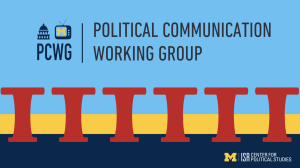Presented By: Center for Political Studies - Institute for Social Research
Through the Grapevine: Socially Transmitted Information and Distorted Democracy
Taylor Carlson

Taylor Carlson (Washington University in St. Louis) is the Winter Speaker for the Political Communication Working Group series:
Accurate information about politics is at the heart of democratic functioning. For decades, those concerned with the information environment have understandably focused on mass media, but many Americans do not learn about politics from direct engagement with the news. Indeed, about one-third of Americans learn about politics from socially transmitted information they acquire from conversations with others and social media. How does socially transmitted information differ from information communicated by mass media? And what are the consequences for political behavior? Drawing on evidence from experiments, surveys, and social media, Carlson finds that, as information flows from the media to person to person, it becomes sparse, more biased, less accurate, and more mobilizing. This results in distorted democracy. Although socially transmitted information does not necessarily render democracy dysfunctional, it does contribute to a public that is at once underinformed, polarized, and engaged.
Accurate information about politics is at the heart of democratic functioning. For decades, those concerned with the information environment have understandably focused on mass media, but many Americans do not learn about politics from direct engagement with the news. Indeed, about one-third of Americans learn about politics from socially transmitted information they acquire from conversations with others and social media. How does socially transmitted information differ from information communicated by mass media? And what are the consequences for political behavior? Drawing on evidence from experiments, surveys, and social media, Carlson finds that, as information flows from the media to person to person, it becomes sparse, more biased, less accurate, and more mobilizing. This results in distorted democracy. Although socially transmitted information does not necessarily render democracy dysfunctional, it does contribute to a public that is at once underinformed, polarized, and engaged.